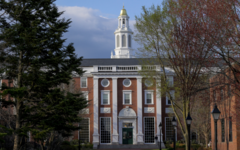Harvard University's legal battle commenced with a lawsuit filed on Monday, aimed at preventing drastic federal funding cuts proposed by the Trump administration. This conflict intensified last week when the prestigious university ignored a series of demands presented by the administration, which sought to target diversity initiatives and address anti-Semitic behavior on campus.
President Trump has frozen $2.2 billion in federal funding and hinted at potential risks to Harvard's tax-exempt status. Harvard's president, Alan M. Garber, expressed concerns in a letter addressing the university community, highlighting the severe and long-lasting repercussions that could stem from government overreach. The White House quickly countered, arguing that the flow of taxpayer funds to institutions like Harvard, perceived as bloated, should cease.
Garber emphasized that this funding freeze jeopardizes essential research efforts, including studies related to pediatric cancer, Alzheimer's, and Parkinson's diseases. The university's lawsuit asserts that the government's actions are an attempt to manipulate academic operations by leveraging federal funding withdrawal.
In addition to the funding freeze, the Trump administration has also threatened to restrict Harvard’s capacity to enroll international students. Garber, who identifies as Jewish, acknowledged the issues of anti-Semitism on campus but asserted that the university is taking proactive measures to address these concerns through newly established task forces.
Harvard is not isolated in facing federal funding threats; similar actions have been directed towards other Ivy League institutions, with Cornell University experiencing a suspension of $1 billion in funding and Brown University facing a $510 million cut. On the other hand, some universities, such as Columbia, have conceded to certain demands after facing potential cuts of $400 million.
The Trump administration's list of demands requires institutions like Harvard to agree to government-sanctioned audits of their curricula and to disclose hiring and admission data. In a stern reply, Harvard's attorney stated, "The university will not surrender its independence or relinquish its constitutional rights," reaffirming the institution's commitment to maintaining autonomy without government influence.
Former President Barack Obama, an alumnus of Harvard, voiced support for the university during this contentious dispute, emphasizing the significance of defending academic freedom and integrity.
President Trump has frozen $2.2 billion in federal funding and hinted at potential risks to Harvard's tax-exempt status. Harvard's president, Alan M. Garber, expressed concerns in a letter addressing the university community, highlighting the severe and long-lasting repercussions that could stem from government overreach. The White House quickly countered, arguing that the flow of taxpayer funds to institutions like Harvard, perceived as bloated, should cease.
Garber emphasized that this funding freeze jeopardizes essential research efforts, including studies related to pediatric cancer, Alzheimer's, and Parkinson's diseases. The university's lawsuit asserts that the government's actions are an attempt to manipulate academic operations by leveraging federal funding withdrawal.
In addition to the funding freeze, the Trump administration has also threatened to restrict Harvard’s capacity to enroll international students. Garber, who identifies as Jewish, acknowledged the issues of anti-Semitism on campus but asserted that the university is taking proactive measures to address these concerns through newly established task forces.
Harvard is not isolated in facing federal funding threats; similar actions have been directed towards other Ivy League institutions, with Cornell University experiencing a suspension of $1 billion in funding and Brown University facing a $510 million cut. On the other hand, some universities, such as Columbia, have conceded to certain demands after facing potential cuts of $400 million.
The Trump administration's list of demands requires institutions like Harvard to agree to government-sanctioned audits of their curricula and to disclose hiring and admission data. In a stern reply, Harvard's attorney stated, "The university will not surrender its independence or relinquish its constitutional rights," reaffirming the institution's commitment to maintaining autonomy without government influence.
Former President Barack Obama, an alumnus of Harvard, voiced support for the university during this contentious dispute, emphasizing the significance of defending academic freedom and integrity.






















